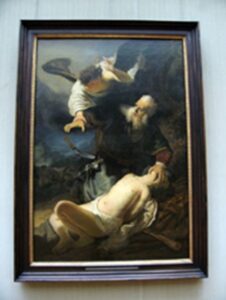Introduction: For hundreds of years many Christian traditions have read passages of scripture using a tool called a lectionary. During this ordinary season, our devotional team decided to resource you with selections from the Revised Common Lectionary. You will encounter texts from the Psalms, the Prophets, and the New Testament as well as formal prayers.
Source: the Revised Common Lectionary Year A
(Note. If you desire to read these passages in a different version of the Bible, this link will provide all the readings for week 2 in ESV in Bible Gateway where you may also choose other versions of these passages.)
Genesis 22:1-14
22:1 After these things God tested Abraham. He said to him, “Abraham!” And he said, “Here I am.”22:2 He said, “Take your son, your only son Isaac, whom you love, and go to the land of Moriah, and offer him there as a burnt offering on one of the mountains that I shall show you.”
22:3 So Abraham rose early in the morning, saddled his donkey, and took two of his young men with him, and his son Isaac; he cut the wood for the burnt offering, and set out and went to the place in the distance that God had shown him.
22:4 On the third day Abraham looked up and saw the place far away.
22:5 Then Abraham said to his young men, “Stay here with the donkey; the boy and I will go over there; we will worship, and then we will come back to you.”
22:6 Abraham took the wood of the burnt offering and laid it on his son Isaac, and he himself carried the fire and the knife. So the two of them walked on together.
22:7 Isaac said to his father Abraham, “Father!” And he said, “Here I am, my son.” He said, “The fire and the wood are here, but where is the lamb for a burnt offering?”
22:8 Abraham said, “God himself will provide the lamb for a burnt offering, my son.” So the two of them walked on together.
22:9 When they came to the place that God had shown him, Abraham built an altar there and laid the wood in order. He bound his son Isaac, and laid him on the altar, on top of the wood.
22:10 Then Abraham reached out his hand and took the knife to kill his son.
22:11 But the angel of the LORD called to him from heaven, and said, “Abraham, Abraham!” And he said, “Here I am.”
22:12 He said, “Do not lay your hand on the boy or do anything to him; for now I know that you fear God, since you have not withheld your son, your only son, from me.”
22:13 And Abraham looked up and saw a ram, caught in a thicket by its horns. Abraham went and took the ram and offered it up as a burnt offering instead of his son.
22:14 So Abraham called that place “The LORD will provide”; as it is said to this day, “On the mount of the LORD it shall be provided.”
Application: Rembrandt’s painting of Abraham and Issac is a masterful study of the technique known as chiaroscuro, Italian for “light-dark”. Chiaroscuro uses strong contrasts between light and dark to achieve a bold effect. I love how Rembrandt used this technique in this painting because the style reflects the subject, the light of God’s direction and the darkness that must have weighed so heavily on Abraham as he prepared to obey God on the mountain.
Take a moment to reflect on the scripture and on the use of light and darkness in this painting.

Psalm 13
13:1 How long, O LORD? Will you forget me forever? How long will you hide your face from me?13:2 How long must I bear pain in my soul, and have sorrow in my heart all day long? How long shall my enemy be exalted over me?
13:3 Consider and answer me, O LORD my God! Give light to my eyes, or I will sleep the sleep of death,
13:4 and my enemy will say, “I have prevailed”; my foes will rejoice because I am shaken.
13:5 But I trusted in your steadfast love; my heart shall rejoice in your salvation.
13:6 I will sing to the LORD, because he has dealt bountifully with me.
Application: In only six verses, the psalmist moves from thoughts of being abandoned by God, to sorrow, despair, humiliation, trust, and rejoicing. While it is short, each verse is profound.
Is there an area of your life that brings you feelings of abandonment and sorrow? Take the time to unpack your hurts and loneliness and bring it all to God.
Go through each verse of this psalm, one by one. Take your time and reflect on each step you travel.

